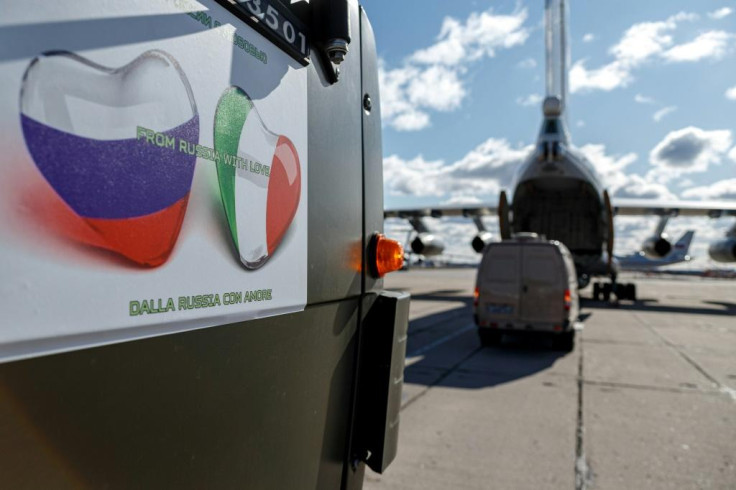Flying aid to virus-hit Italy, Moscow flexes soft power
Russia has not officially reported deaths from COVID-19.
Since the coronavirus took hold in Europe, Moscow has sent planes of virus experts and aid to Italy while fighting accusations of spreading disinformation, flexing its "soft power" in various ways during the pandemic.
The Russian defence ministry released multiple daily statements after the first planes took off for Italy on Sunday, carrying 100 virus specialists with medical equipment, mobile laboratories and disinfection units.
The experts sent to Italy have worked on international epidemics including African Swine Fever and in developing an Ebola vaccine, the ministry said. They are to work in cities including northern Bergamo near Milan, the hardest hit by the virus.
China and Cuba have also sent experts to Italy.
The Russian aid comes at a crucial time for Italy, which has warm ties with Moscow and has supported lifting sanctions against it. Meanwhile European Union countries have been slow to help their fellow member.
The Russian aid comes as the EU is also divided on a potential rescue plan for the region's economy. Germany has warned against unreasonable expectations while Italy, France and Spain have urged a massive response.
"(President Vladimir) Putin scored a win here," political analyst Alexi Malashenko said of Russia's strategy.
"First of all it's humane, secondly it hints that (anti-Russia) sanctions are inappropriate."
Despite its complex geopolitical relations with the West, Moscow is acting in accordance with a tradition of international solidarity that dates back to the Soviet era.
On Wednesday, Russia's ambassador to Washington even said Moscow was ready to release aid to the United States.
Malashenko nevertheless cautioned that "soft power can improve Russia's image but can't transform it."
Moscow has not let up on criticisms of the West.

Foreign ministry spokeswoman Maria Zakharova last week accused the EU of attempting to mask its own problems in the fight against the virus with the help of "unfounded anti-Russian allegations".
Zakharova was responding to accusations of fuelling fears over the virus.
Earlier this month the EU said Moscow is "spreading disinformation about the coronavirus" in a "significant campaign" in social media accounts linked to the Russian state.
This came less than a month after US officials told AFP that thousands of Russian-linked social media accounts on Facebook, Twitter and Instagram had embarked on a coordinated effort to spread alarm about the virus.
Russia has attributed its relatively low number of officially confirmed cases to swift early measures such as closing its border with China at the beginning of the year.
Moscow is building a new dedicated COVID-19 hospital that is due to open in a few weeks, following China's example.
Russian officials have stressed that the majority of the 658 people with confirmed cases in Russia have recently flown back from western Europe.
Russia has not officially reported deaths from COVID-19.
Many Russians find it hard to trust this tally, however, given a past history of official cover-ups.
In an address to the nation on Wednesday, Putin made a sombre assessment, saying Russia cannot seal itself off from the epidemic and urged the public to stay at home.
"What is happening today in many Western countries -- in Europe and across the ocean -- can become our nearest future," he said.
For now, though, the low numbers are working to improve Russia's image abroad, making it appear well-organised and able to impose strong measures.
"If Russia does manage to deal with the virus quickly, that will be further proof that authoritarian regimes work better in such situations," Malashenko said.
That is the message being put out by pro-Kremlin news outlets and on social media.
If the pandemic proves long-standing and the EU is unable to cope, "respect for Russia will rise," Malashenko said.
Copyright AFP. All rights reserved.
This article is copyrighted by International Business Times, the business news leader





















